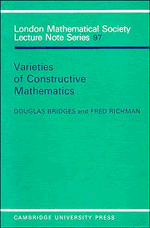6 - CONTRASTING VARIETIES
Published online by Cambridge University Press: 04 April 2011
Summary
In which our three varieties of constructive mathematics are compared and contrasted by a study of the proposition that a uniformly continuous map of [0,1] into the positive real line has positive infimum.
The Three Varieties
The time has come to draw breath and take a comparative look at our three varieties of constructive mathematics. Having done so, we shall undertake a special case-study which will highlight some of the non-philosophical features that distinguish INT and RUSS from BISH.
We begin with BISH, which grows out of the fundamental idea of interpreting ‘existence’ in terms of an intuitive notion of ‘computability’. A most significant feature of BISH is that it is consistent with classical mathematics: every proof in BISH of a statement T is also a classical proof of T. Thus BISH is a generalization of classical mathematics in the same sense that group theory is a generalization of abelian group theory. We pass from BISH to classical mathematics by adopting the law of excluded middle.
BISH is widely accepted as the common core of INT, RUSS, and any genuinely constructive development of mathematics other than a strictly finitistic one. It follows that, within BISH alone, one cannot disprove anything that is provable in INT or RUSS.
- Type
- Chapter
- Information
- Varieties of Constructive Mathematics , pp. 120 - 130Publisher: Cambridge University PressPrint publication year: 1987

